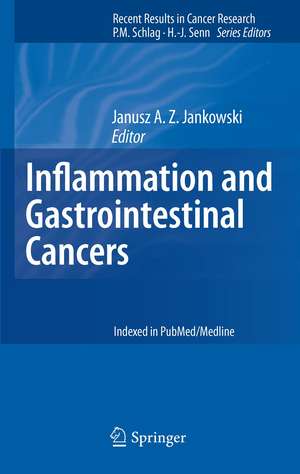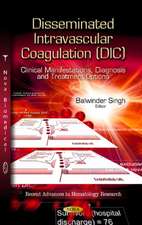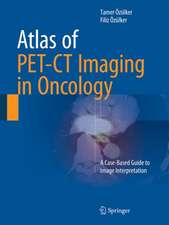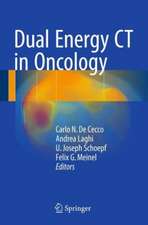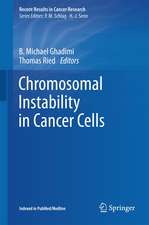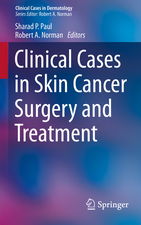Inflammation and Gastrointestinal Cancers: Recent Results in Cancer Research, cartea 185
Editat de Janusz A. Z. Jankowskien Limba Engleză Paperback – 15 iul 2013
This book discusses all aspects of the relation between inflammation and GI cancer, from the basic science through to the translational science which is helping in the optimization of clinical management strategies. Among the topics considered are the impact of inherited syndromes; the roles of acid reflux, H. pylori, inflammatory bowel disease, and primary sclerosing cholangitis; screening strategies; targeted drug therapies; genetics; and the use of endoscopic methods. The authors are the best in their field, and this book is designed for the enthusiastic student as well as the professional in GI science and medicine.
| Toate formatele și edițiile | Preț | Express |
|---|---|---|
| Paperback (1) | 774.04 lei 43-57 zile | |
| Springer Berlin, Heidelberg – 15 iul 2013 | 774.04 lei 43-57 zile | |
| Hardback (1) | 1093.88 lei 43-57 zile | |
| Springer Berlin, Heidelberg – 8 aug 2011 | 1093.88 lei 43-57 zile |
Din seria Recent Results in Cancer Research
- 5%
 Preț: 845.19 lei
Preț: 845.19 lei - 5%
 Preț: 191.69 lei
Preț: 191.69 lei - 5%
 Preț: 782.46 lei
Preț: 782.46 lei - 5%
 Preț: 913.76 lei
Preț: 913.76 lei - 5%
 Preț: 919.23 lei
Preț: 919.23 lei - 5%
 Preț: 400.28 lei
Preț: 400.28 lei - 15%
 Preț: 490.42 lei
Preț: 490.42 lei - 5%
 Preț: 703.83 lei
Preț: 703.83 lei - 5%
 Preț: 721.05 lei
Preț: 721.05 lei - 5%
 Preț: 709.35 lei
Preț: 709.35 lei - 5%
 Preț: 711.15 lei
Preț: 711.15 lei - 5%
 Preț: 710.60 lei
Preț: 710.60 lei - 5%
 Preț: 713.33 lei
Preț: 713.33 lei - 5%
 Preț: 361.80 lei
Preț: 361.80 lei - 5%
 Preț: 712.60 lei
Preț: 712.60 lei - 5%
 Preț: 371.10 lei
Preț: 371.10 lei - 5%
 Preț: 721.96 lei
Preț: 721.96 lei - 5%
 Preț: 716.84 lei
Preț: 716.84 lei - 5%
 Preț: 356.32 lei
Preț: 356.32 lei - 5%
 Preț: 719.74 lei
Preț: 719.74 lei - 5%
 Preț: 717.56 lei
Preț: 717.56 lei - 5%
 Preț: 359.60 lei
Preț: 359.60 lei - 5%
 Preț: 706.41 lei
Preț: 706.41 lei - 5%
 Preț: 717.73 lei
Preț: 717.73 lei - 5%
 Preț: 719.19 lei
Preț: 719.19 lei - 5%
 Preț: 705.32 lei
Preț: 705.32 lei - 5%
 Preț: 718.29 lei
Preț: 718.29 lei - 5%
 Preț: 717.20 lei
Preț: 717.20 lei - 5%
 Preț: 711.15 lei
Preț: 711.15 lei - 5%
 Preț: 712.25 lei
Preț: 712.25 lei - 5%
 Preț: 710.96 lei
Preț: 710.96 lei - 5%
 Preț: 378.97 lei
Preț: 378.97 lei - 5%
 Preț: 1089.68 lei
Preț: 1089.68 lei - 5%
 Preț: 361.06 lei
Preț: 361.06 lei - 5%
 Preț: 712.25 lei
Preț: 712.25 lei - 5%
 Preț: 715.55 lei
Preț: 715.55 lei - 5%
 Preț: 716.84 lei
Preț: 716.84 lei - 5%
 Preț: 720.68 lei
Preț: 720.68 lei - 5%
 Preț: 707.86 lei
Preț: 707.86 lei - 5%
 Preț: 732.01 lei
Preț: 732.01 lei - 5%
 Preț: 715.91 lei
Preț: 715.91 lei - 5%
 Preț: 723.05 lei
Preț: 723.05 lei - 5%
 Preț: 369.10 lei
Preț: 369.10 lei - 5%
 Preț: 709.35 lei
Preț: 709.35 lei - 5%
 Preț: 712.60 lei
Preț: 712.60 lei - 5%
 Preț: 711.52 lei
Preț: 711.52 lei - 5%
 Preț: 719.38 lei
Preț: 719.38 lei - 5%
 Preț: 709.14 lei
Preț: 709.14 lei - 5%
 Preț: 710.06 lei
Preț: 710.06 lei - 5%
 Preț: 724.70 lei
Preț: 724.70 lei
Preț: 774.04 lei
Preț vechi: 814.78 lei
-5% Nou
148.11€ • 155.03$ • 123.28£
Carte tipărită la comandă
Livrare economică 31 martie-14 aprilie
Specificații
ISBN-10: 3642268382
Pagini: 212
Ilustrații: X, 202 p.
Dimensiuni: 155 x 235 x 11 mm
Greutate: 0.3 kg
Ediția:2011
Editura: Springer Berlin, Heidelberg
Colecția Springer
Seria Recent Results in Cancer Research
Locul publicării:Berlin, Heidelberg, Germany
Public țintă
Professional/practitionerCuprins
Textul de pe ultima copertă
This book discusses all aspects of the relation between inflammation and GI cancer, from the basic science through to the translational science which is helping in the optimization of clinical management strategies. Among the topics considered are the impact of inherited syndromes; the roles of acid reflux, H. pylori, inflammatory bowel disease, and primary sclerosing cholangitis; screening strategies; targeted drug therapies; genetics; and the use of endoscopic methods. The authors are the best in their field, and this book is designed for the enthusiastic student as well as the professional in GI science and medicine.
Caracteristici
Descriere
Inflammation in gastrointestinal mucosa can remodel the topography of the overlying epithelium. If such inflammation is chronic, it has fundamental clinical consequences, the principal of which is premalignant metaplasia throughout the alimentary tract. Furthermore, mucosal inflammation, even if subtle, is the single most common pathway for GI cancer.
This book discusses all aspects of the relation between inflammation and GI cancer, from the basic science through to the translational science which is helping in the optimization of clinical management strategies. Among the topics considered are the impact of inherited syndromes; the roles of acid reflux, H. pylori, inflammatory bowel disease, and primary sclerosing cholangitis; screening strategies; targeted drug therapies; genetics; and the use of endoscopic methods. The authors are the best in their field, and this book is designed for the enthusiastic student as well as the professional in GI science and medicine.
